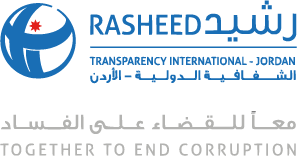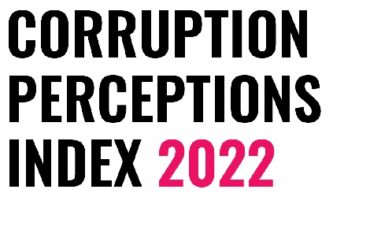Press Release
On the occasion of the launch of the Corruption Perceptions Index results for 2020
Issued by Transparency International
- Jordan’s score increased one point on the Corruption Perceptions Index, to 49 out of 100.
- Jordan maintained the same ranking for two years, being the 60th globally out of 180 countries.
- Jordan advanced by 3.15 points according to the criteria of the source: Rule of Law Index, issued by the World Justice Project, and decreased by 1.89 points on the Varieties of Democracy Index.
- Jordan maintained the fifth place in the Arab world, preceded by the United Arab Emirates, Qatar, Oman and Saudi Arabia.
- Data collection was completed in October 2020.
January 28, 2021, Amman
Rasheed for Transparency and Integrity, a non-profit organization and the local branch of Transparency International (TI), launches today the results of the Corruption Perceptions Index (CPI) for 2020, prepared by TI. The CPI evaluates the public sector and ranks different countries based on the input of experts and executive officials in the business sector.
The CPI is considered a compilation indicator as it relies on data collected through specialized surveys and opinion polls carried out by independent institutions to determine the degree of corruption in the public sector within 180 countries, which is done by assigning a score ranging from 0 (given to those with the most corruption) to 100 (given to countries with the most integrity).
The CPI covers a range of topics of interest to the general public; such as bribery, accountability, monitoring the use of public funds, embezzlement of public money and officials’ abuse of their positions for personal gain. It also tackles the government’s ability to reduce corruption, bureaucratic procedures that contribute to increasing corruption, and favoritism in recruitment and hiring. It also addresses the protection of whistleblowers, journalists, and investigators when reporting cases of corruption, the ability of civil society to access information of public concern and the degree of accountability available to citizens.
These topics fall within eight sources used to calculate Jordan’s score for this year, which are:
- Bertelsmann FDN Transformation Index
- Economist Intelligence Unit Country Ratings
- Global Insight Country Risk Ratings
- The World Competitiveness Yearbook
- Political Risk Services International Country Risk
- Varieties of Democracy Project
- World Economic Forum EOS
- World Justice Project’s Rule of Law
Jordan scored 49 out of 100 on the index for the year 2020, up by one point from 2019. This increase in the overall score is due to a 3.15 points increase in the score of the source: Rule of Law Index, issued by the WJP, whereas in the Varieties of Democracy Index, the score decreased by 1.89 points. As for the remaining five sources, there was a slight increase in all of them.
In the Arab world, the United Arab Emirates scored 71 and Qatar 63, which were the highest scores on the index compared to the rest of the Arab countries. Yemen received a score of 15, Syria 14, and Somalia got the lowest score of 12. The reason for such low scores lies possibly in weak institutions, the absence of the rule of law, the spread of impunity, the restriction and suppression of public freedoms, the weakening of civil society institutions, and the lack of transparency in the preparation and disbursement of public finances.
Globally, Denmark and New Zealand received a score of 88, the highest on the CPI, followed by Finland, Singapore, Sweden and Switzerland, each of which received 85 points. Transparency International’s analysis revealed that these countries adopted gender equality and social justice, and invested more in healthcare than other countries. They also practiced democracy and the rule of law during the response to the COVID-19 pandemic by involving citizens in the process of decision-making.
The improvement of Jordan’s score in the Rule of Law Index might have been due to the impact of amendments made to the Integrity and Anti-Corruption Commission Law as well as the proposed amendments regarding the Audit Bureau Law and the Illicit Gains Law that were sent to the Lower House after endorsement from the Cabinet, “Rasheed” explained.
The said amendments led to enhancing the financial and administrative independence of the Audit Bureau, expanding the scope of its supervision to include grants and support. Moreover, they granted immunity to the president of the bureau, and had their tasks and powers determined and expanded upon, “Rasheed” noted.
“Rasheed” interpreted that the endorsement of the Integrity and Anti-Corruption Commission Law of 2020 increased the commission’s authorities and powers, as it included new crimes categorized as corruption offenses, such as abuse of power, money laundering and crimes listed in article 59 of the Election Law for the Lower House or any article in its place.
The draft law on illicit gains has also been endorsed, which led to moving the Financial Disclosure Department at the Ministry of Justice to the Jordan Integrity and Anti-Corruption Commission (JIAAC), ensuring the independence of its affairs and adding more means to follow up on the declarations submitted by taxpayers, in accordance with the provisions of the law, “Rasheed” said, adding that the draft law also put mechanisms to save and archive the declarations as well as audit them and verify that the information they contain is correct.
These changes constituted a qualitative leap from the traditionally followed measures in accordance with the current law, “Rasheed” explained, noting that the draft law also allowed for submitting the declarations online and listed the means necessary to look into any complaint or notification related to illicit gains in accordance with the committee formed under the provisions of the law.
“Rasheed” attributed the decrease of Jordan’s score in the source: Varieties of Democracy by 1.89 points to the decline in democratic practices, embodied in the freedom of assembly and freedoms of opinion, expression and journalism, according to the source.
An evident increase is noticed in indicators that take into consideration the right to access information as a standard of evaluation, which “Rasheed” said is due to the Cabinet’s endorsement of the draft law on access to information and referral to the Lower House. “Rasheed” said that the draft law added new entities to the Information Council, including professional associations and civil society institutions, and it also consolidated the concept of proactive disclosure in its texts.
Based on the results of the CPI, “Rasheed” recommends the following:
- Strengthening the role of regulatory bodies and institutions by allocating sufficient funds and resources and enhancing the administrative independence necessary for them to perform their duties.
- Continue to harmonize all legislations in accordance with the United Nations Convention against Corruption as well as bilateral agreements, in addition to updating and refining the current legal texts in accordance with the Jordanian experience.
- Ensure the disclosure of actual beneficial ownership and transparent contracting to combat abuse and conflicts of interest, and ensure fair pricing.
- Ensure the right to access information and proactive disclosure of information to the public in a clear manner that can be analyzed electronically and periodically. Publishing data on public spending and resource distribution in general and in emergency and crisis situations in particular, in order to enhance confidence between the citizen and the country.
- Promoting democracy and civil space by providing a clear legislative system that organizes the work of civil society organizations and ensures the continuity and independence of their work. It also should guarantee subsequent supervision and governance of their procedures, and avoid restricting their work.
- Work on ensuring the transparency of the budget in all its stages
- Ensure the protection of whistleblowers, encourage reporting, and support those who have suffered from corruption.
- Publish information contained in the financial disclosure declarations for election candidates, public officials, government leaders and those in charge of managing the funds relating to the pandemic online, updating the information annually and opening effective communication channels with citizens.
- Resume the central records for bids to include the ones on public contracts and real estate purchases of local and foreign companies.
- Prosecute all the corrupt without exception and ensure they undergo a fair trial.
- Lift any restrictions on freedom of opinion and expression to enable accountability based on actual, non-fabricated information, in order to boost trust between the citizen and the country.
- Warn and monitor government bodies to ensure they do not bypass legal texts, adhere to human rights when implementing the law and avoid causing damage or through exaggerated measures by law enforcement personnel of various institutions, taking legal measures against transgressors.
Rasheed for Integrity and Transparency (Transparency International – Jordan) is a non-profit civil society organization, established at the end of 2013, and is the only national branch of Transparency International in Jordan. “Rasheed” aims to strengthen the foundations of good governance based on transparency, integrity, accountability and the rule of law, as well as to raise the level of integrity and efforts to combat corruption in the public and private sectors, and to enhance the awareness of individuals from various sectors of the importance of transparency, accountability and reporting corruption. The organization also aims at enhancing the legal frameworks and national integrity system through communication, cooperation and exchange of experiences with international, regional and local organizations and working to expand the amount of data and information available to citizens.




